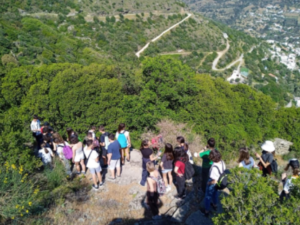News . Best Practices Landscape and Renewable Energy Sources (RES)

This good practice presents an open school education initiative for the European CONNECT project, developed by Tinos High School and Professors Evangelos Pavlis (PE04.05), Sofia Hapidis (PE05) and Pelagia Kyriakopoulou (PE86) from (17/01/ 2022 to 27/05/2022). Scientists participated in the activities:
- Dr. Dionysios Papachristou, Special Advisor to the Energy Regulatory Authority (RAE). His contribution was about describing the role and importance of Renewable Energy Sources.
- Dr. Evangelos Pavlis, teacher at Tinos High School (PE 04.05), Teacher at EAP in landscape matters. His input was about its meaning, functions, dimensions and values
- Landscape.
- Dr. Mousis Mylonas, Emeritus Professor of Ecology, University of Crete. His advice was about the concept, functions and value of the Ecosystem.
Supported by Dr. Georgios Panselinas Coordinator of the CONNECT Educational Informatics Project who provided information and guidance. This practice was presented at an event organized by Tinos High School at the Spiritual Center of the Holy Foundation of Evangelistria on Thursday 25 May 2022 at 19.00: Members – CONNECT (exus.co.uk) (alternatively ‘Landscape & Renewable Energy’ (Connect) – TINOS HIGH SCHOOL (sch.gr))
Care: The students dealt with the issue of the integration of RES in the landscape, a real problem that occupied the students of Tinos in view of the massive installation of wind turbines in the landscape of Tinos. The students who participated in the activities were twenty-eight (28), 14-year-old students of the 2nd Class of the High School.
Know: The students used knowledge about the role and importance of RES considering their rational integration in landscapes and ecosystems, considering their functions and value.
The skills the students practiced were:
- question processing,
- data analysis,
- discussion of claims and evidence,
- drawing or drawing conclusions,
- familiarity with the ways and stages of conducting a research,
- familiarity with techniques for searching, evaluating and presenting information through a variety of sources,
- development of collaboration, creative expression and presentation skills.
Do: At the end, students put their knowledge into practice by doing field research. A 2-day Educational Visit was made to the landscape of the paths of Andros (in collaboration with KPE Korthiou). The program of the visit included group work in and outside the field, namely: Practical-Experiential Part: hiking, information, observation, photography, exploration and activities, landscape experience with all the senses.
In detail, the practical-experiential part contained:
- Observation and recording of field characteristics
- Familiarity with the space through all the senses
- Perception of space through various games
- Identification of species of flora (mainly) and fauna
- Map reading
- Completing worksheets
- Presentation of the habitats of Andros and the most important historical stations
- Discussion about the needs of the people who created the landscape of Andros.
Creative Part: recording of valuable elements and problems of the landscape and ecosystem, discussion related to threats and proposals for better management. The result was a group presentation of the results of all work groups through a powerpoint work, which was presented by student representatives at an event organized by the High School of Tinos at the Spiritual Center of the Holy Foundation of Evangelistria on Thursday 25 May 2022 at 19.00, in which they took part and their parents/guardians. The presentation emerged from the discussions with the scientists in the context of the “learn” section and from the practical-experiential part of the training which included filling in worksheets (of the KPE), individual notes and group discussions.
The parents/guardians of the students who participated in the CONNECT program were informed about its content both in person (those who visited the school) and electronically with frequent messages describing the activities. This ensured as active an involvement as possible them in the whole project (a fact that helped to cultivate the scientific capital). The results of their program were presented extensively at a live event organized by the school.
Conclusions on Open Schooling: The action was not embedded in the curriculum, but indirectly related to it. It was useful and innovative as it related to the development of knowledge, skills and attitudes (as discussed below). Open schooling can also be useful for other teachers because it can combine knowledge and apply it in the field (eg identifying and valuing natural and cultural wealth of an area)..
The change/innovation was supported by:
[ x ] School management [ ] school association/network [ ] Local government [ ] Other: ________________________________
Student results: The students showed interest in the thematic subjects of the program, submitted questions and participated in discussions. They took into account what the scientists conveyed to them and a relationship of trust was cultivated. This was reflected in the results of the action. Notably, there were also examples of relatively weak students showing great interest in the collaborative method and field research and taking initiatives. They responded with particular enthusiasm to the educational visit (outside the island), which was an important motivation for their activation at all levels of thinking and action.
This practice contributed to the increase of:
[ ] engaging families with sciences [ x ] involving girls in science [ x ] raising awareness among students about careers in the natural sciences
Please specify: Parents participated in the collection of questionnaires for the student survey. The girls actively participated in the mapping and literature review and in general all students showed a special interest in digital maps and the contribution of geomorphological terrain to road construction.